|

Winter
1998 (6.4)
Pages
22-23

New Comedy Theater Opens with Social Satire
Uzeyir Hajibeyov's Masterpiece
by Abulfazi Bahadori
Costume and Set Design by Ismayil Mammad
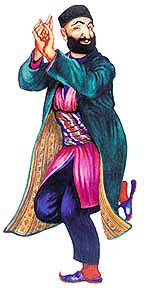  In December 1998, the
long-awaited opening of Baku's new Musical Comedy Theater finally
took place. An earlier theater of the same name was built on
the same site by the esteemed Oil Baron-turned-philanthropist
Haji Zeynal-abdin Taghiyev more than a century ago. The new theater's
operatic season opened with the recasting of one of Azerbaijan's
most famous comedies, Uzeyir Hajibeyov's (pronounced oo-ZEH-yir
hah-jee-BEH-yov) "O Olmasin, Bu Olsun" (If Not That
One, Then This One) or familiarly known by the name of its protagonist,
"Mashadi Ibad." In December 1998, the
long-awaited opening of Baku's new Musical Comedy Theater finally
took place. An earlier theater of the same name was built on
the same site by the esteemed Oil Baron-turned-philanthropist
Haji Zeynal-abdin Taghiyev more than a century ago. The new theater's
operatic season opened with the recasting of one of Azerbaijan's
most famous comedies, Uzeyir Hajibeyov's (pronounced oo-ZEH-yir
hah-jee-BEH-yov) "O Olmasin, Bu Olsun" (If Not That
One, Then This One) or familiarly known by the name of its protagonist,
"Mashadi Ibad."
Azerbaijan International's Azeri Editor Abulfazl Bahadori analyzes
why this satirical comedy so popular in the early part of the
century is so relevant today as once again, Azerbaijan attempts
to integrate into a capitalist society, this time from a socialist
system, rather than a feudalist system which was the case at
the turn of the last century.
Uzeyir Hajibeyov (1885-1948) was a multi-talented genius
who excelled in depicting the social issues that concerned society
the most, not only in his musical compositions but also in his
writings and plays. The operatic comedy, "O
Olmasin, Bu Olsun" (If Not That One, Then This One) is his finest work
in this respect. It was written in 1910 and first staged in 1911.
Since then, it has been translated into various languages and
even staged outside of Azerbaijan or what was once the Soviet
Union.
In 1956, the play was adapted for screen by Azerbaijani film
producer Husein Sayidzade. It turned out to be the most successful
Azerbaijani comedy ever produced on screen-a distinction it holds
to this day. The filmmakers even succeeded in getting the film
distributed outside of the Soviet Union. For example, in Tabriz,
my hometown, there was a small, old movie theater (Cinema Iran)
which once devoted the entire month of Ramadan to "Mashadi
Ibad." I remember my parents taking me there, and the theater
being absolutely packed.
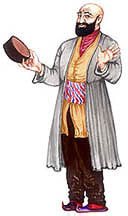 |
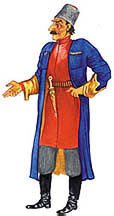 |
 |
 |
|
Mashadi Ibad |
Rustam Bey |
Gulnaz |
Sarvar |
Historical Context
Consider the historical and geographical context of the play.
The first two decades of the 20th century in the region were
very uncertain and turbulent. Baku, with its enormous resources
of oil, became one of the most vibrant cities of the Russian
empire. Then, as now, the city was full of contradictions. Both
capitalist and working class elements lived side by side causing
irreconcilable differences. At the turn of the century, capitalism
was undermining the traditional feudal wealth and social status
of land owners in the Russian Empire.
Hajibeyov's play opens with Rustam Bey, an aristocratic landowner
who has become bankrupt. Strapped for cash, he feels he has no
choice but to do the unthinkable: marry off his only beloved
daughter, Gulnaz, to a local merchant. Enter Mashadi Ibad, an
uneducated merchant who has recently acquired considerable wealth,
but who just happens to be quite old-fashioned and at least 30
years older than the beautiful Gulnaz.
 |
 |
 |
 |
|
Gazetchi
Reza |
Intelligent
Hasan |
Hasangulu
bey |
Hambal |
Hajibeyov was
always a stalwart supporter of women's rights. At the age of
four, he is said to have complained bitterly to his mother about
the veil she was required to wear whenever she went out into
the traditional Muslim society. He felt it covered her pretty
face and he didn't want to accompany her. As years passed, his
sensitivity to the plight of women only intensified. Hajibeyov
must be hailed as one of the most progressive writers of Azerbaijan,
given that he wrote many of his works when women in many Western
countries didn't even have the right to vote.
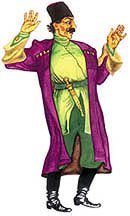 |
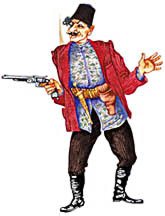 |
|
Rustam
Bey |
Gochu
Askar |
Of course, Gulnaz
refuses to marry Mashadi. The first time he comes to visit her
family bearing gifts, we see the rich merchant mulling over the
contradictions of his life compared to hers. Though he has more
cash than the girl's father does, he is not of the same class.
He does not live in a mansion, nor is he acquainted with a luxurious
lifestyle.
While waiting
in another room, he wonders how a girl brought up in such style
could ever be confined to his dark home and limited social life.
"Well," he concludes, "if she revolts, I'll imprison
her! She should be scared of me. The more a wife is frightened
of her husband, the more she will obey him."
From the early scenes of the play, we expect Mashadi to be a
real monster, but Hajibeyov is not given to drawing his characters
in black and white. He creates complex portraits and soon reveals
Mashadi's naive and very human side. Mashadi's only fault turns
out to be that he is rather old-fashioned and out of touch with
the rapidly changing times.
Left: The new Musical Comedy
Theatre on opening night, December 8, 1998. Photo: Rafig Bagirov.
Right: Curtain call at the Inaugural performance
of "Mashadi Ibad" in the new Musical Comedy Theater
(December 8, 1998). Mashadi Ibad was played by Hajibaba Bagirov.
Photo: Rafig Bagirov.
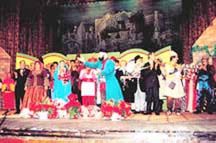 |
 |
The Dinner Party
The
part of the play that best reveals the social issues of the day
is the engagement dinner party hosted by the father of the bride-to-be,
Rustam Bey. Every guest at the dinner represents a different
social or political sector of Baku society.
Mashadi himself represents a traditional Azeri and hence the
old values. However, Hajibeyov soon creates a sympathetic nostalgia
for him and the traditions that are destined to die away. For
example, Mashadi refuses to join others at a table where alcoholic
beverages are being served, choosing rather to sit in a corner
sipping tea. He even uses the edge of his long coat to shake
hands with those who have touched the bottle. Most of the guests,
who have become rather tipsy, are bragging about themselves and
their "intelligence." Mashadi is too uneducated to
understand some of the topics but his short comments expose the
shallowness of the arrogant guests. Such satire is common throughout
the play. Hajibeyov does not promote Western values at the expense
of traditional ones. He resists blindly imitating European ways
and uses Mashadi as his spokesman.
Another guest at the dinner party is Gochu Askar, a racketeer
whose sole purpose at the party is to ensure its security. In
fact, during the first years of this century, so many uprisings
in Czarist Russia served to weaken the distant parts of the Empire,
including Azerbaijan, so anarchy was left to rule in Baku. Every
district was controlled by a different mafia. Mashadi, like many
other businessmen, had to bribe his own district's racketeer
in order to survive. At the dinner party, Hajibeyov acknowledges
this reality of life by bestowing upon Gochu Askar the honor
of rising to offer the first toast.
The most arrogant and narrow-minded guest is Reza Bey. He is
a true Pan-Turkist. He butchers the Azeri language, mixing it
up with Ottoman Turkish so that no one can understand him. This,
in turn, frustrates and offends him. Hajibeyov mocks the strong
Turkic elements in the newly born nationalism that was developing
in Azerbaijan despite the fact that it was promoted by intellectuals
who had studied in Turkey. Hajibeyov believed in healthy and
natural exchange among cultures, but always tried to shield Azerbaijani
music and culture from harmful outside influences. For example,
he cautioned traditional mugham (pronounced moo-GAHM) singers
not to improvise as Persian singers did. He also warned against
widening the gap between written and oral forms of Azeri by adopting
the ostentatious and haughty Ottoman style.
Another character, Hasan Bey, is a flamboyant westernized alcoholic
who confuses Azeri with French and Russian. He manages to offend
Mashadi when at great length, he elaborates about the new Darwinian
theory of evolution, suggesting that Mashadi's ape-like features
are enough to confirm the controversial theory. "To prove
Darwin right, one need not go all the way to Africa in search
of apes that look like man," says Hasan Bey. "It is
sufficient to study Mashadi in our own little gathering."
And then Hasan Bey provokes his host by further inquiring, "So
how is it that Rustam Bey is giving his beautiful daughter, his
only daughter, to an ugly man like Mashadi?" Hasan Bey goes
on to answer his rhetorical question: "Maybe, for his wealth
and money! No, that cannot be true! I think it's simply because
Mashadi is a good Muslim!" And with that challenge, Mashadi
explodes. The dinner party turns into a barroom brawl and Rustam
Bey's house becomes a battlefield. The party is over.
The Role of Hambal
The second most important character is Hambal. The word itself,
in Azeri, refers to a cheap laborer who carries heavy objects
on his back. Hajibeyov doesn't even give this character a name,
but simply calls him Hambal and uses him to expose the depth
of discrimination against the working class. His insights were
exactly on target. Within less than ten years, one of the bloodiest
revolutions in the history of mankind would erupt as a consequence
of these conditions.
As the story develops, Mashadi becomes obsessed with seeing his
betrothed and tries to carry out the traditional practice of
"adakhli bazliq" (secret rendezvous). In those days,
a girl could not simply walk out of her father's house to visit
her boyfriend, nor could the boy simply knock at the door and
walk in. Therefore, secret meetings had to be arranged. Traditionally,
the lover usually chose a quiet time during the day or night,
and simply climbed over the courtyard wall of the girl's home.
As Mashadi is too old to do this, he seeks to hire a hambal.
When he beckons for one, many come running. Hajibeyov uses this
scene to depict the depth of poverty and unemployment that existed
in society.
The oil wealth in Baku had attracted many poor people from Iranian
Azerbaijan who spoke the same language and could cross the border
freely to earn a little money through cheap labor. Hence Hambal
speaks with a southern Azeri accent. To help Mashadi fulfill
his desire to see Gulnaz, the skinny, malnourished Hambal bends
down and the fat, heavy Mashadi steps up on his back to peer
over the courtyard wall. He does catch a glimpse of her. But
to his amazement, she is not alone. Gulnaz is with a handsome
young man, Sarvar, who announces to Mashadi that he is Gulnaz'
fiancé.
The Final Twist
Of course,
Mashadi becomes enraged, feeling totally betrayed by Rustam Bey,
who has already charged him a lot of money for his daughter.
He calls for help. News travels fast and all the opportunists
who were at the previous night's dinner party rush to assist,
or rather "rip-off," the devastated, but naïve,
merchant. Mashadi pays large sums to all of them, but still denies
a single penny to the character that has helped him the most,
Hambal.
Meanwhile, Sarvar meets with Gulnaz' father. They decide to tell
Mashadi that he is really the girl's uncle and that he was only
joking when he announced that he was her true lover. Mashadi
is satisfied. The wedding night arrives. After the traditional
ceremonies, the veiled bride is escorted to Mashadi's room. Finally,
he is alone with her. He does his best to create a romantic atmosphere
by lighting candles and singing romantic Persian poetry. The
moment arrives when he begins to lift the veil from her face-which
is when he gets the shock of his life. "O, my God! Who are
you? You're not the girl! You're that guy again!"
  Left: Mashadi Ibad was played by Hajibaba
Baghirov, "People's Artist". Left: Mashadi Ibad was played by Hajibaba
Baghirov, "People's Artist".
Instead of Gulnaz,
Sarvar is under the veil. He loses no time and sticks a fake
gun to Mashadi's head, forcing him to annul the marriage certificate
and sign another one. Mashadi readily complies and hence the
title; "If not that one, then this one." It all ends
happily as Mashadi marries the chubby maid Sanam who he preferred
anyway and who fancied him as well. And Gulnaz gets to marry
her true love, Sarvar. The only one who doesn't win out in the
end is Hambal who never sees a single penny for all his efforts.
He winds up being the epitome, not of cheap labor, but of slavery
itself.
Abulfazi
Bahadori is the Azeri editor of Azerbaijan International. He
has enjoyed performances of "Mashadi Ibad" since childhood.
From
Azerbaijan
International
(6.4) Winter 1998.
© Azerbaijan International 1998. All rights reserved.
Back to Index
AI 6.4 (Winter 1998)
AI Home
| Magazine
Choice | Topics
| Store
| Contact
us
|















